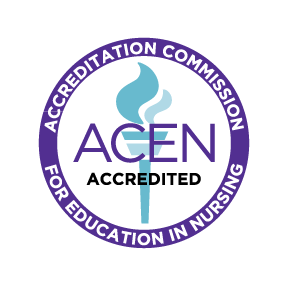An Admissions Counselor
Can Help You:
Finish your degree sooner | Make college affordable | Create a plan to achieve goals
Fill out our 3-Step form to get started
Prepare for Enhanced Responsibility and Impact in the Workplace with an MS in Nursing Leadership and Administration of Health Care Systems
The evolving health care system calls for nurse leaders who can manage clinical experiences, fiscal challenges, organizational systems, and human resources. Expert communication skills are needed to integrate these diverse and often competing elements into a strategic plan that ensures the health of the population. This fully online Master of Science in Nursing Leadership and Administration of Health Care Systems program empowers you with the skills and knowledge you need to play a vital role in health care systems, have a seat at the executive table, and have an influential voice when essential decisions are made about health care.
Online courses and an individualized practice experience, in which you assume a leadership role under the guidance of an experienced mentor, prepare you for leadership roles in a variety of settings. Nurse leaders make an impact in acute health care facilities, community health centers, academic institutions, information technology organizations, and pharmaceutical industries, among other places.
The dynamic and challenging curriculum provides a flexible means for registered nurses to earn a master’s degree and preparation for advanced professional roles as a nurse leader.
This program requires outstanding critical thinking skills and nursing judgment as well as commitment to academic rigor.
Are you interested in our dual degree RN to MS in Nursing Leadership and Administration of Health Care Systems program? Learn more.
Fast Facts:
The median health services manager salary is $98,350 (Source: BLS)
Opportunities in nursing leadership and management positions are expected to grow by 23 percent (Source: Nurse Journal)
Graduates with a MS in nursing can work as nurse anesthetists, nurse midwives, and nurse practitioners (Source: BLS)
38
credit hours
Online MS In Nursing Leadership and Administration of Health Care Systems Program Details
Core Courses: 14 Credits
Transformational Nursing: Innovation, Inquiry, and Scholarship
This course explores how nursing may be transformed. The ways of knowing set a foundation for knowledge acquisition and competencies for master’s-prepared nurses. The need for nurses to be innovators, through the application of inquiry and scholarship, are discussed in relation to such topics as leadership, change, and power. Theory-based and scientific competencies are examined as they relate to specializations in nursing. A spirit of inquiry, combined with creativity, curiosity, and the translation of evidence, is explored through critical conversations that support interprofessional collaboration and professional nursing roles in a dynamic healthcare environment.
Theoretical Foundations of Nursing Practice
Theoretical Foundations of Nursing Practice focuses on the exploration of nursing knowledge development to include philosophy, theories, models, and concepts that have been designed to guide nursing practice. It provides approaches to analyze and critique a variety of theories in nursing and related fields.
Research and Evidence-Based Practice
Research and Evidenced-Based Practice focuses on the research process and the analysis and evaluation of research to integrate the best evidence into practice. Emphasis is on the identification of generic and discipline-specific health care issues, synthesis of client care and research initiatives to inform evidence, and translation of research to support and inform practice innovations.
Policy, Ethics, and Population Health
This course examines public policy, political ideology, and ethics as they shape health policy across populations. Political ideology, social and health policy are considered within the lens of population based health and reducing health disparities. The role of the master’s-prepared nurse is to lead and advocate within the public policy arena is explored and discussed. Contemporary issues in health policy viewed from the perspective of ethics and the social and material determinants of health are considered. A primary focus of the course is consideration and development of the knowledge and skills
Cognate Courses: 6 Credits
Epidemiology
The science of epidemiology is essential in planning disease prevention interventions, developing an understanding of disease etiology, identifying trends in morbidity and mortality, and providing a basis for the development of public health policy. This course will serve as an introduction to the core concepts and methods of epidemiology. Students will explore factors related to the etiology and distribution of illness in populations including exposure, transmission, and prevention. Methodologies used in surveillance techniques will also be introduced and explored.
Graduate Elective
To meet the required number of program credits, 3 graduate-level elective credits must be taken. These may be completed within the graduate program or transferred from other graduate programs if they are deemed eligible for credit.
The leadership and administration component consists of four online courses totaling 12 credits.
Management of Clinical Systems
Management of Clinical Systems focuses on the application of management principles, processes, techniques, and tools to shape a supportive environment of care and promote continuous improvement in clinical care systems.
Management of Fiscal and Operational Systems
Management of Fiscal and Operational Systems focuses on the application of management principles to design cost-effective clinical systems and achieve optimal resource use across the health care enterprise.
Leadership in Organizational Systems
Leadership in Organizational Systems focuses on critical examination of leadership styles, strategies, and competencies of the nurse executive in order to successfully manage the health care enterprise. It emphasizes leadership skills for strategic planning, enhancing team performance and interdisciplinary collaboration, and creating a culture of quality performance.
Management Information for Decision Support
This course focuses on the identification, acquisition, analysis, interpretation, and application of data, databases, and decision-making strategies for health care. It emphasizes decision-support systems concepts, as well as methodologies and technologies, and includes content on model management, knowledge management, and strategies to consider when selecting decision-support systems.
The Nursing Leadership and Administration Capstone: 6 Credits
This culminating experience provides learners with an opportunity to apply the knowledge and skills they’ve acquired throughout the program of study, focusing on the competencies of the graduate-level nurse. This course consists of several integrated components: a 135-hour practice experience, discussion, reflective journal, scholarly paper, and project presentation.
- Function as a leader and change agent to promote holistic patient-centered care and population health.
- Translate evidence to develop health care practices in a culturally and ethnically diverse global society.
- Synthesize theoretical and empirical knowledge from nursing and other disciplines that are essential for nursing judgment and practice.
- Integrate specialty practice knowledge to enhance inter-professional collaboration, inform decisions, and improve outcomes.
- Exemplify professional values and standards, best practices, and the commitment to lifelong learning in the role of the master’s-prepared nurse.
- Implement the role of master’s-prepared nurse as part of the inter-professional team.
- Integrate scholarship, a spirit of inquiry, and innovation to support nursing excellence.
- Apply effective written communication methods to resolve complex problems and organizational issues.
Surveys are administered to our nursing program students upon graduation and at one year post-graduation. The survey results are available here.
View our catalog for additional information.
Common Careers with an
Online MS In Nursing Leadership and Administration of Health Care Systems

- Nurse Executive
- Chief Nursing Officer
- Dean/ Chair of Academic Program
- Nurse Manager
- Nursing Director
- Public Health Nurse Leader
- Nurse Researcher
- Clinical Coordinator
Explore Common Careers

Herma Lee
Master of Science in Nursing
2018
Recognitions & Accreditations
New York State Board of Regents – Recognized Programmatic Accreditation
Excelsior University’s associate-level nursing programs are programmatically accredited by the New York State (NYS) Board of Regents, State Education Department Office of the Professions (the Regents). The U.S. Department of Education has recognized the Regents as a state agency for the approval of nursing education programs since 1969. More information about the NYS Board of Regents’ Recognized Programmatic Accreditation may be helpful for students or graduates to present to a school they are attending or to an employer seeking more information about their Excelsior University nursing degree.
ACEN Accreditation
The bachelor’s and master’s nursing programs at Excelsior University are accredited by the:
Accreditation Commission for Education in Nursing (ACEN)
3390 Peachtree Road NE, Suite 1400
Atlanta, GA 30326
404-975-5000
These programs include Bachelor of Science in Nursing, Master of Science in Nursing Leadership and Administration of Health Care Systems, Master of Science in Nursing Education, Master of Science in Nursing Informatics, RN to Master of Science in Nursing Leadership and Administration of Health Care Systems, RN to Master of Science in Nursing Education, and RN to Master of Science in Nursing Informatics.
The most recent accreditation decision made by the ACEN Board of Commissioners for the bachelor’s nursing program in March 2019 is Continuing Accreditation.
The most recent accreditation decision made by the ACEN Board of Commissioners for the master’s nursing programs in March 2019 is Continuing Accreditation.
View the public information disclosed by the ACEN regarding these programs at acenursing.us/accreditedprograms/programSearch.htm.
Institutional Accreditation
Excelsior University is an accredited institution and a member of the Middle States Commission on Higher Education (MSCHE or the Commission) www.msche.org. Excelsior University’s accreditation status is accreditation reaffirmed. The Commission’s most recent action on the institution’s accreditation status on June 23, 2022 was to reaffirm accreditation. MSCHE is recognized by the U.S. Secretary of Education to conduct accreditation and pre-accreditation (candidate status) activities for institutions of higher education including distance, correspondence education, and direct assessment programs offered at those institutions. The Commission’s geographic area of accrediting activities is throughout the United States.
All of Excelsior University’s academic programs are registered (i.e., approved) by the New York State Education Department.


